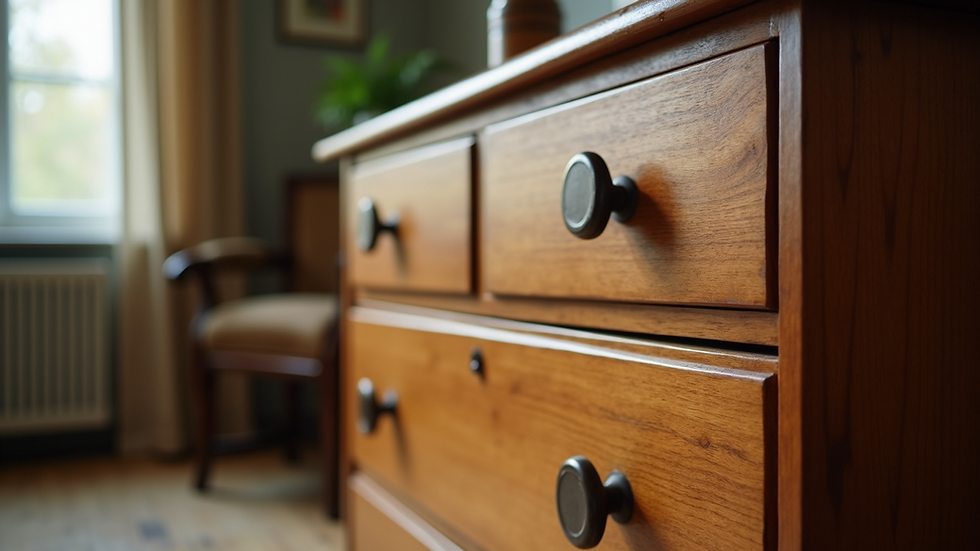Antique Furniture Restoration: Preserving the Past
- Joshua Brett
- Sep 15, 2025
- 4 min read
Antique furniture holds a special place in our homes and hearts. These pieces tell stories of the past and add character to any space. But over time, wear and tear can take a toll. That’s where restoring vintage furniture comes in. It’s a way to bring old treasures back to life while keeping their charm intact. I’m excited to share practical tips and insights on how to care for and restore these timeless pieces.
Why Restoring Vintage Furniture Matters
Restoring vintage furniture is more than just fixing scratches or broken parts. It’s about preserving history and craftsmanship. Many antique pieces were made with quality materials and techniques that are rare today. When you restore them, you keep that artistry alive.
Plus, restoring furniture is eco-friendly. Instead of buying new, you reuse and reduce waste. It’s a smart choice for anyone who cares about sustainability.
Here are some reasons why restoring vintage furniture is worth it:
Unique style: Vintage pieces have designs you won’t find in modern stores.
Sentimental value: Many antiques are family heirlooms with emotional meaning.
Investment: Well-restored antiques can increase in value over time.
Quality: Older furniture often uses solid wood and durable construction.

Tips for Restoring Vintage Furniture
Restoring vintage furniture can be a rewarding project. Whether you’re a beginner or have some experience, these tips will help you get started and avoid common mistakes.
1. Assess the Condition
Before you begin, carefully inspect the piece. Look for:
Loose joints or broken parts
Scratches, dents, or missing veneer
Water damage or stains
Old finishes that need stripping
Knowing what you’re dealing with helps you plan the restoration process.
2. Clean Gently
Start by cleaning the furniture with a mild soap and water solution. Avoid harsh chemicals that can damage the wood or finish. Use a soft cloth or sponge and dry thoroughly.
3. Repair Structural Damage
Fix any loose joints or broken parts using wood glue or clamps. For missing pieces, you might need to carve or buy replacement parts that match the original style.
4. Strip Old Finish Carefully
If the finish is damaged, use a chemical stripper or sandpaper to remove it. Work in a well-ventilated area and wear protective gloves. Be gentle to avoid damaging the wood underneath.
5. Refinish with Care
Choose a finish that suits the piece’s style. Options include:
Wax for a soft, natural look
Oil for deep nourishment and shine
Varnish or polyurethane for durability
Apply thin coats and let each dry completely before adding the next.
6. Preserve Patina
Patina is the natural aging of wood that adds character. Avoid over-sanding or stripping away this layer. It’s part of what makes vintage furniture special.
7. Upholstery Restoration
If your piece has fabric, consider reupholstering with materials that match the original or complement the style. This can refresh the look without losing authenticity.

Restoring Vintage Furniture: Where to Start
If you’re new to restoring vintage furniture, start small. A side table or chair is a good beginner project. Gather basic tools like sandpaper, wood glue, brushes, and finishes.
Watch tutorials or take a local workshop to learn techniques. Practice patience and take your time. Restoration is about care, not speed.
For more complex repairs or valuable antiques, consider professional help. Experts have the skills and tools to handle delicate work and preserve value.
If you want to explore professional options, check out antique furniture restoration services that specialize in quality care.
How Much Does It Cost to Restore Antique Furniture?
Cost is a common question when it comes to restoring vintage furniture. Prices vary widely depending on:
The piece’s size and condition
The extent of repairs needed
Materials and finishes used
Whether you do it yourself or hire a professional
DIY Costs
Doing it yourself can save money but requires time and effort. Basic supplies like sandpaper, wood glue, and finish might cost $20 to $100. Upholstery materials add to the budget.
Professional Restoration
Hiring a professional can range from $100 for minor repairs to several thousand dollars for extensive restoration. Professionals offer expertise that protects your investment and ensures quality results.
Tips to Manage Costs
Get multiple quotes from local restorers
Prioritize repairs that affect structure and safety
Consider phased restoration to spread out expenses
Use quality materials to avoid future problems

Caring for Restored Vintage Furniture
Once your furniture is restored, proper care keeps it looking great for years. Here are some simple tips:
Dust regularly with a soft cloth
Avoid direct sunlight to prevent fading
Use coasters and pads to protect surfaces
Keep humidity levels stable to prevent wood warping
Polish occasionally with appropriate products
Regular maintenance prevents damage and preserves the beauty of your vintage pieces.
Bringing History Back to Life
Restoring vintage furniture is a wonderful way to connect with the past. It’s about more than fixing wood and fabric - it’s about honoring craftsmanship and stories. Whether you tackle a project yourself or trust a professional, the result is a piece that shines with history and character.
If you have treasured furniture that needs care, consider expert restoration. It’s an investment in beauty, quality, and heritage that lasts for generations.
Ready to bring your vintage furniture back to life? Start your restoration journey today and enjoy the timeless charm these pieces bring to your space.










Comments